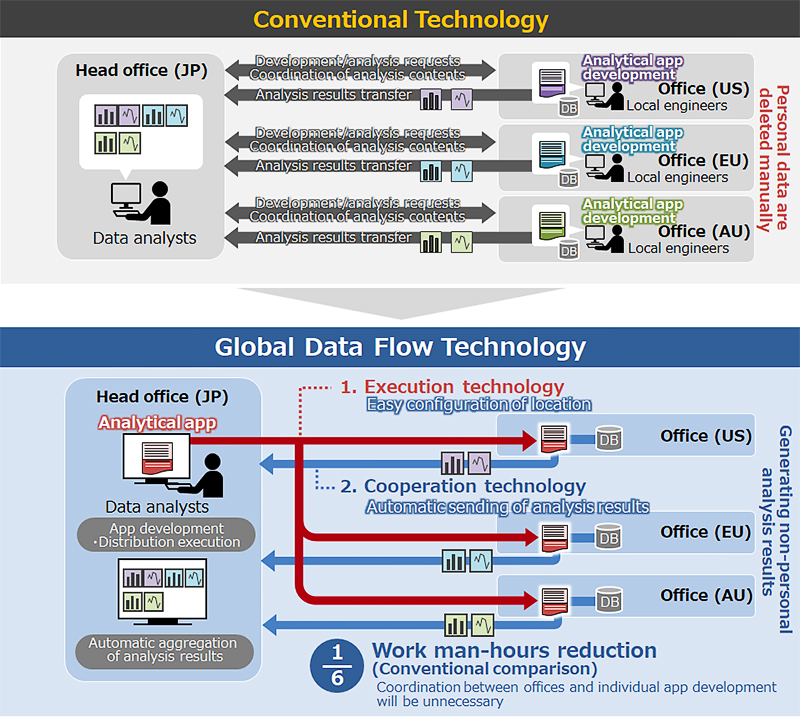Reduces data transfer workload to approx. one-sixth, demonstrates global data flow in compliance with Japanese, EU, U.S. and Australian data transfer regulations
August 18, 2020

Hitachi, Ltd. has developed a Global Data Flow Technology that can streamline global data analysis and data transfer while protecting personal data and complying with each country or region’s data protection laws. This system performs analysis of confidential data without human input inside the countries or regions in which it was generated and transfers the results, which do not include personal data, to the other countries and/or regions. Demonstration of this system in four locations - Japan, Australia, the U.S. and the EU - revealed that it reduces the human workload for data transfer to approx. one-sixth that of other methods.
Hitachi has incorporated this technology into Lumada Solution Hub*1. With this technology in Lumada Solution Hub, Hitachi is promoting the utilization of data generated in business activities around the world in compliance with data protection and contributing to solving various social issues using digital technology.
Recently, the need for free use of data has increased in all social activities; however, strict management and appropriate use of personal data and confidential information are also strongly required. Japan responded to this thinking at the 2019 World Economic Forum Annual Meeting with the idea of “Data Free Flow with Trust,” a basic concept needed to extend data governance and business globally. For example, manufacturers operating on a global scale visualize and analyze the proficiency levels of their workers to improve production plans and give technical support to their workers. In such cases, since some data protection laws such as GDPR*2 prohibit transfer of workers’ personal data across countries and regions, the personal data has to be converted to anonymized data and transferred to the other country/region where the data analysts are. However, this workflow often requires manual analysis by engineers at each manufacturing base, which increases the workload of global data analyses.
To reduce the workload, Hitachi developed this Global Data Flow Technology.
Demonstration of this system in four locations - Japan, Australia, the U.S. and the EU - revealed that it reduces the human workload for data transfer to approx. one-sixth that of other methods.
Part of this technology was presented at IEEE MobileCloud 2020 at Oxford University in the UK on August 3-6, 2020.
With this technology, data analysts can configure the location to perform processes within one application so that a process using personal data can be configured to be performed only in the location where the personal data was generated. In addition, processes using personal data, such as the anonymizing process and data transfer, are automatically performed without human input.
Furthermore, because it employs the same container technology*3 as Lumada Solution Hub, the system can perform the application without depending on an executing environment at each location. This feature allows data distributed across multiple locations to be analyzed and transferred by one application, reducing workload across the board, from requesting data analysis by local engineers to sending results to data analysts.
The system uses Hitachi Application Framework/Event Driven Computing*4 (HAF/EDC), which is a highly reliable and scalable platform for executing distributed processing, to transmit processing orders between applications at different locations. This enables high-speed processing of large amounts of data from multiple, distributed environments, reducing the time required for data analysis and data transfer. In addition, even if one server fails, the system can continue to perform the application because HAF/EDC automatically works with other running servers. Therefore, an application that requires high reliability can be performed by this system.
For more information, use the enquiry form below to contact the Research & Development Group, Hitachi, Ltd. Please make sure to include the title of the article.